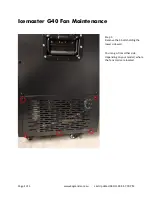
Bandit
45
Copyright 12/17
MODEL 18XP/1590
MAINTENANCE
7.
Check chipper drum assembly:
Check the condition of knife holder threads, secure
welds, torqued bolts, excessive wear and impact
cracks. If a problem is found contact the chipper
manufacturer or an authorized Bandit dealer. Also
check the chipper housing at this time. Check the
chipper base, belly band, and hoods for wear or
damage. Also inspect the chipper bearings.
8.
Check chipper disc/drum to turn:
Very carefully, manually with a pry bar or wood
bar, turn the chipper disc/drum a full revolution.
This is to ensure the anvil and knives have proper
clearance. If the chipper disc/drum is jammed with
debris or frozen in place, DO NOT attempt to start
the engine and engage clutch until the chipper
disc/drum rotates freely.
9. Check the condition of the fan blades, knives,
anvil, and attaching hardware:
Sharpen, file, or replace the knives to keep them
sharp. Check the fan blades, anvil, and attaching
hardware for the knives and anvil. Replace if
necessary.
10.
Properly torque the knife mounting hardware:
All knife mounting hardware must be factory
approved. Knife mounting hardware must
be replaced after maximum of 4-5 knife
rotations/changes to ensure safe clamping ability.
Torque set, AT ALL TIMES to: 180 ft.-lbs. (245 Nm)
11.
Hood lock pin and padlock:
After closing chipper hood, reinsert the hood pin and
padlock, make sure pin is tight and secure. If worn
replace immediately. Don’t use a worn or makeshift
hood pin. Make sure the spring lock for the hood
pin is in the correct position on disc chippers. Make
sure the chipper hood engine disable plug is installed
correctly and that it is also operating properly.
12.
Grease all feedwheel and chipper bearings daily:
Use an EP-2 Lithium type grease only for all
bearings. Purge chipper bearings with grease.
You can not over grease these bearings. Grease
feedwheel bearings with one shot of grease. Both
types of bearings are designed with a relief system
that will not allow over greasing. In other words, you
can not hurt the bearing seals by pumping in too
much grease. Most of the failures related to bearings
are diagnosed as “Contamination”. Contamination
is caused by improper lubrication. Wipe off excess
grease.
Excessive grease will attract dirt.
DAILY START UP & MAINTENANCE (cont.)
13. Check and oil feedwheel slide box:
Check that the feedwheel slide box is working
smoothly and oil with 10W/30 type motor oil. Clean
and oil the slide guides. After pinning, chaining, and
blocking the top yoke in the up position, clean and
oil each side of the bottom yoke. New machines,
especially, need oiling to ensure correct operation
during break-in.
14. Check / adjust the chipper drive belt tension:
Inspect belt condition and replace if needed. The
belts will need to be tightened several times in the
first 2 to 48 hours of operation. A loose belt will
slip and then glaze over. Once they slip you must
replace them. Check hydraulic pump drive belts also
if equipped. See pages 64 - 65 for procedures.
15.
Check the hydraulic pump and motor shafts:
Check the hydraulic pump and hydraulic motor shafts
for fit and tightness.
16.
Check hydraulic oil level:
The hydraulic oil reservoir tank level should always
remain at 3/4 to 7/8 full. Remember to check DAILY
to avoid excessive heat build up.
17.
Check for any fluid leaks:
Inspect for any oil, fuel, hydraulic oil, or engine
coolant leaks. Check all hoses, fittings, lines, and
tanks. DO NOT use fingers or skin to check for
hydraulic leaks. Repair or replace any damaged or
leaking components.
18.
Check hydraulic control valves:
Inspect all hydraulic control valves and ensure they
operate smoothly and shift correctly.
19. Check the fuel level:
Check the fuel level, running out and repriming is
time consuming. Do not over fill, and you must leave
fuel expansion space in the top of the tank: 1/2” (13
mm) from the top for gasoline engines and 2” (50
mm) diesel engines.
20.
Check engine oil and coolant level:
Follow the engine manufacturer manual
recommendations for fluid levels. You
MUST follow
specific ENGINE MFG. manual recommendations
for radiator coolant, additives, lubrication, correct
engine speed, ETC.
21.
Check DEF level on Tier 4 engines:
Check the Diesel Emissions Fluid (DEF) level on
Tier 4 engines. Fill to engine manufacturer’s manual
recommendations.
















































